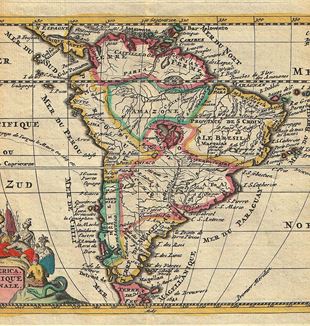
Time to Learn
A Church “going out” and unexpected encounters: Julian De La Morena, leader of CL in Latin America, talks about what is changing his life and that of his friends.“The truth about Latin America is that Christ is there.” Just like that, it’s the first thing Fr. Julián de la Morena says about the “New World,” as he calls it. We spoke to him as he was preparing to spend Holy Week at a women’s prison in Belo Horizonte.The Spaniard has been in South America since 2002. Part of the Priestly Fraternity of the Missionaries of St. Charles Borromeo, he’s guided the Communion and Liberation communities spread across the continent for six years now.
What do you think, looking at Latin America today?
There are some major problems: drug trafficking, violence, the economic crisis. But more than that, what I see are facts that demonstrate how Christ continues to be present. Pope Francis is very much a presence in South America as the universal Shepherd. And he’s offering a step toward peace in the continent. Or better, he’s at the heart of a “pastoral conversion” in the Church in Latin America.This is the key word: pastoral conversion.
What does that mean?
It’s a very concrete conversion, which is met with resistance from a certain “traditionalist” mentality. Even within the same Church, amongst us Catholics. Francis doesn’t want to identify which political proposal is more friendly or hostile; he gets rid of all the divisions and categories. He seeks out what is essential to the faith, with the strong desire to go to meet everyone, to create a new world of peace. He opens up dialogue with people who are, ideologically, far from the Church. Christ spoke to everyone.This means that there’s a seed in the other that we have to learn to get to know. How is this other person good for me? In the fact that you see that Christ is seeking him or her. Whoever he is, whatever he may have done. What’s asked of us is to try not to "close up" the Incarnation, Christ who seeks others. Only a Church “that goes out” can nurture this. The strength of the “first” Church, the Church at the beginning, was that it didn’t stay in Jerusalem. They went to Spain in the first century and to India... Defensiveness is weak, because it cages in the Incarnation.This going out is what the Pope proposes to us. And the Movement as well.
How is this changing Latin America?
The New World is becoming a place of impossible encounters.Who could’ve imagined that Castro would offer the only communist airport in South America for a meeting to promote unity in the Church after a thousand years? Unity, which is the greatest testimony to the resurrected Christ! So, Latin America is living the challenge of showing something about Christ the Church still hasn’t learned. This happens through new paths that are opened, that begin. The Church is a place of new paths. And it picked Cuba, a country that’s always been a problem, looking at it as a possibility. Bringing peace in Cuba means bringing peace in the entire continent, because though it’s small, it’s strategic.
Can you describe the newness the Church is bringing to Latin America?
Patience within history. The patience needed to resolve problems. Mercy is not something private, it affects how society is built, it’s pastoral. Jesus’ gaze changes the world. It opens dialogue between two enemies and show them that the point is not making accusations of the other.We all feel safer if we can say there is a “bad guy,” but this offers nothing to help a man or woman change. Yet it’s clear that the Church, well before Francis, has always worked to build bridges in a world where we only point to limits, to what is missing. This doesn’t mean evil or mistakes don’t exist. The Church isn’t naïve, rather She looks at the person, not at the “offence,” because for Her, a greater power exists.
What do you see in the experience of the Movement in South America today?
Where people work on understanding their experience, they become like a lighthouse, wherever they are. They are tiny lights in an immense continent, like stars in the night, they help orient you. Our friends in Venezuela discovered that there was a better option than opposing the government. Two of them–two university professors– told me that they were no longer able to eat meat, fish, etc., and have resorted to potatoes: “We have to be creative with our potatoes!” they told me. I was very moved by this. You can go through life complaining or you can become ever more attentive to reality to find solutions. There’s a woman who’s well-off who is making her own undergarments; friends who are giving from what they have to meet the needs of the other; those who are younger are discovering charitable work, to the point of volunteering to help bathe one friend’s aging mother. I also see a great thirst. They ask question about each word, wanting to understand and go deeper.